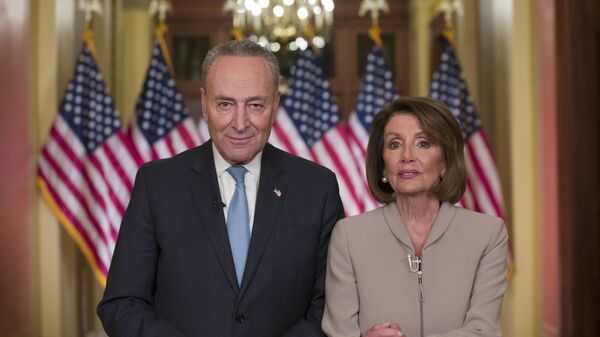House Speaker Nancy Pelosi and Senate Minority Leader Chuck Schumer held a news conference on Friday, as lawmakers are embroiled in discussions over the next coronavirus economic support package.
STILL NO DEAL FOR NEXT ROUND OF COVID-19 RELIEF: Speaker Nancy Pelosi and Senate Minority Leader Chuck Schumer hold a press conference to discuss the ongoing negotiations for the next round of coronavirus relief. https://t.co/wgjqyvFBhJ
— NowThis (@nowthisnews) August 7, 2020
The Democrats are arguing for a massive investment package to support those unemployed and maintain economic stability as the US reemerges from the coronavirus lockdown.
Leader Schumer described their proposals as "bold investments to help average folks" but also said "we are willing to make compromises" with Republican lawmakers who wish to see spending introduced at a limited capacity.
He described the proposed scheme as "necessary but not sufficient" and outlined plans for the new economy to support workers such as sanitisers, bus drivers, and teachers.
Schumer also warned that if the economy is not revitalised, delayed ballots could threaten the nation's ability to hold a "fair election" in November 2020.
The senate leader described the economic fallout of the coronavirus as a "flood" while Republicans are treating the crisis as fixing a "leaky faucet".
"Executive orders won't come close to doing the job that is needed", he said.
Speaker Pelosi highlighted how Republicans were willing to give public spending to support the stock market but refuse to "shore up American's working families".
Describing the situation as "pay now or pay later, she argued that the money spent would generate investment, consumer confidence, spend in the economy in order to create jobs.
"We have a moral responsibility to find common ground - we will go down a trillion, you go up a trillion", she proposed.
In response to a question about whether their Republican counterparts are negotiating in "good faith" Schumer described former-Tea Party member and White House Chief of Staff Mark Meadows as "hardened and non-compromising".
In response to a question asking if they would support a stimulus bill that promised less than $2 trillion, Schumer rejected the possibility of such a scheme due to political arithmetic.
"The House doesn't have the votes to go south of 2 trillion, the senate Democrats can't go south of 2 trillion, that's what compromise is all about", he said.
"There are 20 Republicans who don't want to vote for anything, that doesn't mean the whole thing should shift in their direction. You have to meet in the middle".
He said that the coronavirus response is not just a "numerical game" and that the package would mean real-world affects.
"This is feeding kids, opening schools, employing people, helping people who need help, this is having fair elections, these are very substantive things to us", he added.
Pelosi said that this virus reflects the disproportionate development across the country and that the money would go towards supporting "all of America's children.'
The brief follows a three-hour deadlock on Thursday between politicians which led to no deal between Republicans and Democrats. This was just the latest meeting in rounds of negotiation, which have run for a week and a half so far.
“We have always said that the Republicans and the president do not understand the gravity of the situation, and every time that we have met, it has been reinforced", Speaker Pelosi told reporters amid the meeting.
Today I’m standing with families, teachers, first responders, essential workers, and elected officials across #NY22 to demand Speaker Pelosi and Leader McConnell include support for state and local governments in any future coronavirus relief package. pic.twitter.com/MFQ6mVIN4t
— Rep. Anthony Brindisi (@RepBrindisi) May 4, 2020
Lawmakers have failed to come to an agreement over the proposed bill, with Democrats saying that there should be a $600-a-week jobless support proposal while Republicans want to see it decreased to $200 weekly.
The White House has offered middle-ground proposals, reportedly supporting a $400 per week extra payments into the end of 2020 and President Trump has threatened to use executive action to end the deadlock.
While the Democrats accuse their opposition of being driven by an aversion to state spending, the Republicans likewise have made accusations of being ideological and "partisan".
"If Democrat leaders put partisan demands aside, we would reach an agreement very quickly. It would happen very quickly. In the meantime, my administration is exploring executive actions,’ Trump said on Wednesday during a White House press conference.
Mark Meadows issued a Friday deadline to the Democrats to agree to a deal before an executive order is made.
White House Chief of Staff Mark Meadows dances around the question when asked if Trump can extend expanded unemployment benefits, and stop evictions with an executive order because Trump can't. pic.twitter.com/wTiVNRjyCI
— Sarah Reese Jones (@PoliticusSarah) August 5, 2020
Last month, Speaker Pelosi proposed her 'HEROs' bill of $3 trillion in economic support, while the Republican's 'HEALs' bill includes just $1 trillion.
At the end of July, the United States economy dropped a record 32.9% rate n the second quarter as the coronavirus pandemic saw cost millions of jobs lost.


